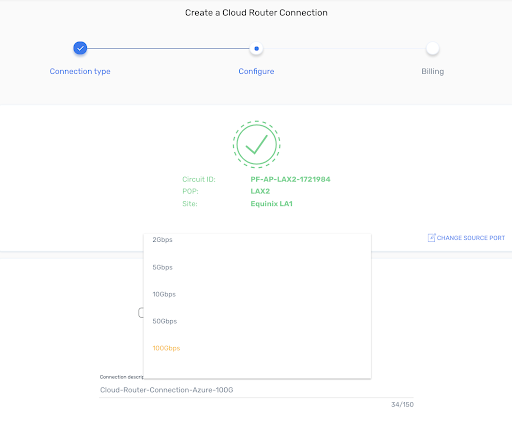Even in the holidays, the innovation train doesn’t stop rolling at PacketFabric, so I thought I’d give a couple of cool updates to our award-winning Virtual Cloud Router product. Before I do that, let’s look back on a great year for Virtual Cloud Router.
A Steady Diet of Features, Awards, and Customer Adoption
We initially released Virtual Cloud Router at the beginning of 2021 as the first 100G+ capable Virtual Cloud Router, a scalability distinction that still stands.
Over the course of the year, Virtual Cloud Router has bulked up with enhanced features and reach, including:
- Site-to-site IPsec VPN support which allows you to tie in remote and off-net locations via VPN tunnels at up to 2 Gbps and connect those sites to public cloud providers via direct connections which offer lower egress fees and our five nines SLA
- Network Address Translation, which allows you to build private connections to SaaS and other services like AWS S3 via a public virtual interface (VIF) and Microsoft Peering.
- Availability across both North America and EMEA
But that’s not all. Through the year, the innovation that Virtual Cloud Router represents has been recognized in a bevy of award inclusions and wins including CRN, Leading Lights, ChannelVision, Pipeline Innovation Award, Layer 123 Network Transformation, Tech Trailblazers, and Stratus Cloud Awards.
While we really appreciate these kudos, the best recognition always comes from our customers. Virtual Cloud Router is the fastest growing new product in PacketFabric history, and I couldn’t be more gratified with the value that customers are getting from this solution.
Dedicated 100G Cloud Connections, now including Azure!
As mentioned, due to the scale and performance of the PacketFabric NaaS platform, Virtual Cloud Router has the ability to support up to 100 Gbps throughput. Of course, that means you want to be able to get 100G cloud connections. These aren’t available on a “hosted direct connection” basis, but you can get those speeds with a dedicated cloud connection. Over time, we added dedicated cloud connection support for AWS, then GCP and most recently we’ve added that support for Microsoft Azure. No other virtual cloud router in the market offers this capacity and range of choice, so we’re excited to keep pushing the envelope on scale.
Three steps to provision dedicated 100G Azure Virtual Cloud Router connection
1. Create a dedicated 100G cloud connection
![]()
Once the port is provisioned, proceed to the next step.
2. In your Virtual Cloud Router, add a dedicated port connection. The 100G Azure port will be available as the source port.
The
3. Get ready for 100G bandwidth!
BFD Support
One other thing we recently added is support for BGP Bidirectional Forwarding Detection protocol. This has been one of our most popularly requested Virtual Cloud Router features, so we’re pleased to release this new feature, which allows for much faster detection of neighbor failures. The failure detection timers for BFD allow for shorter time limits than default failure detection mechanisms for BGP which is typically around 90 seconds – this helps decrease the traffic reconvergence time.
In the BGP settings page of a Virtual Cloud Router connection, BFD parameters are configurable as follows:

Don’t worry about supply chains, get started with Virtual Cloud Router
One of the things that is bedeviling nearly everyone when it comes to IT and networking infrastructure is the supply chain challenge of getting equipment. If you’re trying to tie together multiple cloud regions and cloud providers, there’s no need to worry about supply chains, physical infrastructure, cross-connects, etc. You can simply connect your cloud regions together via Virtual Cloud Router with no hardware required. If you’re ready to give this a go, register for an account on our portal. If you want to get a walk through of Virtual Cloud Router or other PacketFabric solutions, request a demo.